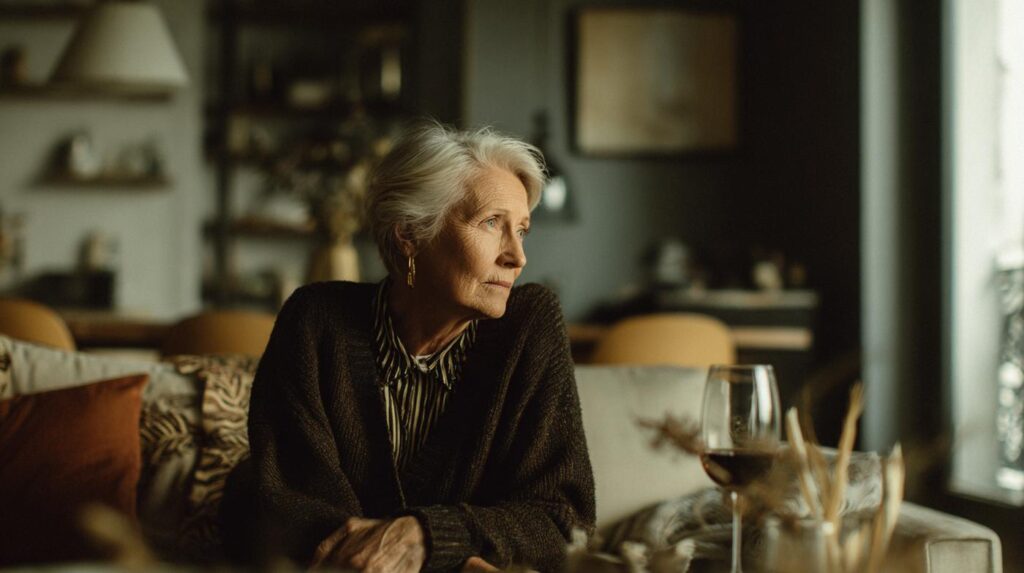A Reality We Don’t Talk About Enough
When we think of an alcoholic, the cultural shorthand often defaults to someone younger, perhaps with the outward chaos of missed work, broken relationships, and DUIs. But the truth—an uncomfortable truth—is that an elderly alcoholic may look nothing like this stereotype.
They may be your retired neighbor, the grandmother who makes “just one” cocktail each evening that has slowly become three, or the widower who finds that wine softens the sharp edges of grief.
Research suggests that alcohol use disorder among adults over 65 is both more common and more underreported than most people imagine, partly because it’s easy to confuse symptoms with the normal aches, pains, and forgetfulness of aging.
Elderly Alcoholic: Different Effects
Part of what makes this issue so quietly insidious is how alcohol’s effects change with age. The body’s metabolism slows, lean body mass decreases, and water content in the body drops—all of which mean alcohol stays in the system longer and hits harder.
A single drink in an older adult can produce blood alcohol levels that would take two or three drinks in younger years. That’s not “lightweight”—that’s biology.
How Common Is This, Really?
Surveys estimate that around 10% of older adults engage in binge drinking, and another significant percentage drink daily at levels that can be harmful over time. These numbers climb in certain subgroups, like older adults with depression, chronic pain, or a history of trauma.
The statistics are complicated by the fact that many elderly alcoholics never get officially diagnosed—either because they’re not asked about drinking in medical appointments, or because they downplay it themselves.
Family members might chalk it up to “they’ve earned it” or “that’s just their routine,” not realizing that the combination of age-related vulnerability and high tolerance can mask a dangerous dependence. Alcohol misuse in later years is often invisible until something dramatic happens—a fall, a hospitalization, or sudden cognitive decline.

The Signs You Might Miss in an Elderly Alcoholic
Identifying an elderly alcoholic can be tricky because the warning signs often mimic age-related conditions. Watch for:
- Unsteady walking or frequent falls
- Mood swings, irritability, or withdrawal from activities
- Worsening memory problems or confusion
- Neglecting personal hygiene or nutrition
- Changes in sleep patterns or appetite
In many cases, these symptoms are blamed on “just getting older,” which delays proper treatment and lets the damage deepen.
Why the Risks Are Different for Older Adults
Alcohol’s dangers are magnified in older bodies. Even moderate drinking can interfere with common medications—blood thinners, antidepressants, blood pressure meds—leading to dangerous interactions.
The immune system’s slower repair rate means injuries heal more slowly. The liver, already less efficient with age, takes longer to clear toxins. And falls, already a major risk for seniors, become more likely and more serious with even small amounts of alcohol.
Brain Issues
There’s also the brain to consider. Chronic alcohol use in older adults accelerates cognitive decline, and in some cases can mimic or worsen dementia symptoms. If memory problems are already present, drinking can push those deficits into dangerous territory.
Alcohol doesn’t just affect the brain through hangovers and blackouts. It can cause direct, long-term changes in brain structure and chemistry—shrinking certain regions, impairing neurotransmitter balance, and reducing blood flow.
Double the Danger
In elderly alcoholics, these changes may be compounded by preexisting issues like small strokes, vascular problems, or Alzheimer’s disease. The result is a kind of one-two punch to cognitive function: less mental clarity, poorer judgment, and diminished capacity to learn new information.
For some older adults, cutting back or stopping alcohol can lead to partial cognitive improvement, but timing matters. The longer heavy drinking continues, the harder it becomes to reverse damage. This is why treatment, even later in life, is worth pursuing—it can mean the difference between years of meaningful independence and years of preventable decline.
What Treatment Can Look Like
Treatment for an elderly alcoholic often requires a tailored approach. The withdrawal process can be physically harder, and medical supervision is essential to avoid dangerous complications.
At Covenant Hills Treatment Center, we understand that older adults may have different needs than younger clients—slower-paced therapy, careful medication management, and a focus on both physical and emotional stability.
Our programs can include medical detox, residential treatment, outpatient care, and specialized counseling for co-occurring issues like depression or grief.
Therapy for older adults often incorporates life review and meaning-making—helping clients see that sobriety isn’t about “what’s left” but about making the most of every single day that remains. The work may involve family, caregivers, and physicians to ensure recovery is supported from every angle.
Addiction Help for the Elderly in Orange County
If you or someone you love might be an elderly alcoholic, now is the time to act—quiet suffering is not a requirement of age. Covenant Hills Treatment Center offers compassionate, medically informed care designed for every stage of life.
Whether you need residential treatment, outpatient support, or dual-diagnosis services, our team is here to help you restore health, dignity, and clarity. Call us today at 833-964-2244.








